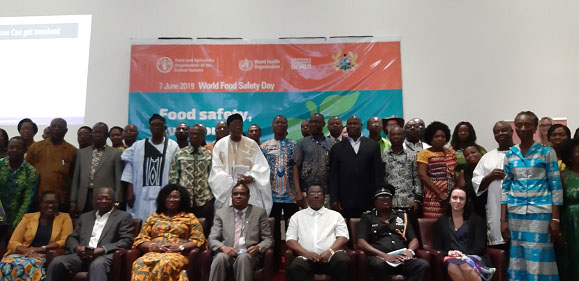Participants in a group photograph after the symposiumO
An estimated 137,000 people in Africa die every year from contaminated food, the World Health Organisation (WHO) has said.
According to the WHO, the African region has the highest burden of food-borne diseases with more than 91 million people falling ill from consuming contaminated food.
“Children under five years of age carry 40% of foodborne disease burden, with 125 000 deaths every year,” Dr. Owen Kaluwa said at the maiden commemoration of World Food Safety Day in Accra.
Themed ‘Food Safety, Everyone’s Business’, the day was to highlight the relevant food safety issues in order to develop interventions and recommendations that could be used to promote safe food practices among Ghanaian populace.
Dr. Kaluwa, who spoke at the symposium, said globally 600 million, representing almost one in 10 people in the world fall ill after eating contaminated food, with 420, 000 dying every year, resulting in the loss of 33 million healthy life years.
“A recent World Bank study finds that the public health cost estimate of foodborne diseases in low and middle-income economies alone is a staggering $15.1 billion,” he added.
Dr. Kaluwa said food-borne diseases are preventable and everyone from policymakers to consumers has an important role to play, adding that “food can become contaminated at any point of production and distribution, there is, therefore, a need for all food producers, handlers and consumers to understand the importance of adopting basic hygienic practices when buying, selling and preparing food to protect their health and that of the wider community.”
Dr. Abebe Haile-Gabriel, Assistant Director General and Regional Representative for Africa, Food and Agriculture Organisation (FAO), indicated that the commemoration marks an important milestone for the organisation’s other partners, as together they scale up their joint efforts in food safety advocacy and mobilisation of partnerships.
He said the FAO has been supporting the efforts of the government of Ghana in improving the safety and nutritional balance of food through for example collaboration with the Food & Drugs Authority on ‘Healthy Street Food Incentives’ to boost the safety and nutritional balance of street food.
“Another TCP is being finalised to support to the strengthening of food safety control systems in collaboration with the Food & Drugs Authority, Veterinary Services Directorate, Plant Protection & Regulatory Services, Ghana Standards Authority and the Ministry of Fisheries & Aquaculture Development,” he added.
Delesi Mimi Darko, Chief Executive Officer (CEO) Food 7 Drugs Authority (FDA), emphasized the need for urgent actions to be taken to prevent food contamination “as any adverse food safety incident may have global negative effects on public health, trade and economy.”
She said improved food safety results in reduced food-borne illness, protect customers, improve one’s stands within a community and also enhance consumer confidence.


